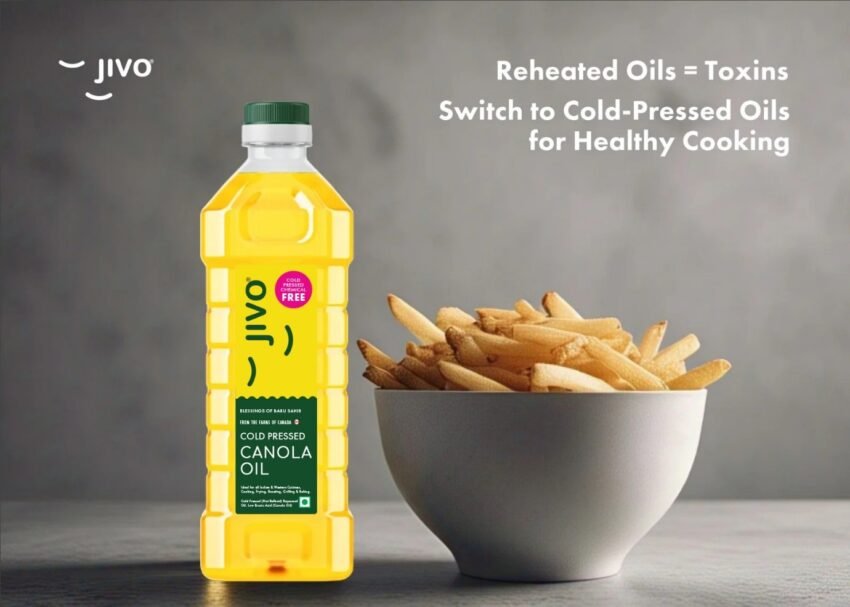Sharma Ji had just returned from the doctor, clutching a prescription and with a mindful of doubts. His head was still ringing with the questions that the doctor has asked.
He had assured the doctor that he always had home-cooked meals, and he also believed he made healthy choices. But the rising cholesterol levels and persistent acidity had become an unavoidable concern.
“Do you reuse your cooking oil?” the doctor had asked casually, yet pointedly.
It was a habit Sharma Ji never thought twice about – frying pooris and pakoras in the same oil, reheating leftovers, saving a half-used kadhai for the next day.
But that simple kitchen routine might have been silently working against his health, and probably of his other family members too.
Turns out, several studies have already warned about the harmful health effects of repeatedly using heated cooking oils. Repeated heating of cooking oils breaks down the fats in the oil, leading to the formation of toxic compounds.
And that’s where the shift to healthy cold-pressed oils becomes a necessity, preferably to the best cooking oils in India
What are the Toxic Compounds in Cooking Oils
Any cooking oil, when heated beyond its smoke point, begins to break down and release toxic compounds, primarily Aldehydes, Acrolein, Polycyclic Aromatic Hydrocarbons (PAHs), Trans Fats, Lipid Peroxides, and others.
- Aldehydes – Formed when oils degrade at high heat, and can cause DNA damage, inflammation, and cancer.
- Acrolein – Formed from the breakdown of glycerol in fats, and can irritate eyes, lungs, and throat. It is toxic when inhaled.
- Polycyclic Aromatic Hydrocarbons (PAHs) – Formed when oils are overheated or food is charred, and can cause lung and colon cancer.
- Trans Fats – Formed when oils are overheated or partially hydrogenated. It can raise bad cholesterol (LDL) and increase heart disease risk.
- Lipid Peroxides – Formed during the oxidation of fats, and can damage cells and organs. It can also cause oxidative stress.
Cooking Oils Rich in PUFA More Likely to Produce Toxic Compounds
Cooking oils high in polyunsaturated fats (PUFA) are more likely to break down and form toxic compounds when repeatedly heated because their chemical structure contains multiple double bonds. These double bonds make PUFAs unstable and highly reactive to heat, leading to rapid oxidation. When heated repeatedly, PUFAs break down into harmful substances like aldehydes, free radicals, and even carcinogens such as polycyclic aromatic hydrocarbons (PAHs). This increases health risks, including heart disease and cancer. To stay safe, switch to Jivo’s healthy cooking oils and avoid reusing PUFA-rich oils like sunflower, soybean, and corn oil for frying or high-heat cooking.
Sunflower Oil
Sunflower oil is high in polyunsaturated fats (PUFAs), particularly linoleic acid, and because of this, it is unstable at high temperatures and can easily break down when repeatedly heated or reused. This breakdown leads to the formation of toxic compounds such as aldehydes and polycyclic aromatic hydrocarbons (PAHs), which are linked to health risks like inflammation, heart disease, and even cancer.
Soybean oil
Soybean oil is also rich in PUFAs, and when repeatedly heated, it undergoes oxidation and degradation, which produces harmful substances like aldehydes and volatile organic compounds. These toxic compounds can cause oxidative stress and increase the risk of chronic diseases. The high PUFA content in soybean oil makes it less stable for high-temperature cooking, and its repeated use can further amplify the formation of unhealthy byproducts.
Corn oil
Corn oil has a high amount of polyunsaturated fats, especially omega-6, which makes it break down easily when heated. When corn oil is heated repeatedly, it not only loses beneficial nutrients like vitamin E but also generates toxic compounds such as trans fats and aldehydes. This process accelerates with each reheating, increasing the risk of harmful effects on heart health and overall well-being. Because corn oil is not very stable at high temperatures, it’s better to avoid using it for deep frying or repeated cooking.
How to Avoid Toxic Compound Formation in Cooking Oil
One of the ways to avoid toxin formation is to stop reusing your cooking oil. The other option is minimal heat cooking, i.e., not to heat beyond the smoke point. The third one is to choose the best cold-pressed cooking oil in India, as these oils are nutrient-rich because they are naturally extracted under minimal heat, and are chemical-free.
The best way to minimize the release of toxic compounds during cooking is by choosing high-quality, best cooking oils in India.
Here’s why Cold-Pressed Oils are best for you:
Cold-Pressed Extraction
All cold-pressed cooking oils are extracted using a natural method—mechanical pressing at low temperatures without the use of chemicals. This process preserves natural antioxidants and nutrients, making the oils more stable and less likely to form toxic compounds during cooking. Jivo’s oils are among the best cold-pressed cooking oils in India, perfectly suited for Indian cooking.
Rich in Monounsaturated Fats (MUFA)
Cold-pressed canola oil is especially rich in monounsaturated fats, which are more resistant to heat-induced breakdown compared to polyunsaturated fats. This makes it a healthy and stable choice for high-temperature cooking.
Natural Antioxidants
Cold-pressed sunflower oil and Jivo cold-pressed canola oil retain more antioxidants, like vitamin E and polyphenols, due to the cold-press method. These antioxidants help neutralize free radicals and reduce the risk of toxic compound formation during cooking.
Minimal Processing
All cold-pressed oils, including cold-pressed groundnut oil, undergo minimal processing, ensuring they keep their natural protective compounds and freshness, which further reduces the potential for harmful substance formation.
Balanced Fatty Acid Profile
Cold-pressed canola oil offers a balanced ratio of saturated, monounsaturated, and polyunsaturated fats, enhancing its resistance to heat-induced breakdown and making it suitable for various cooking methods. It is one of the best cooking oils in India, known for its heart-supportive properties.
Choose the Best Cooking Oils
Choosing the best cooking oil in India is crucial for your health. By avoiding repeated heating and switching to Jivo cold-pressed oils, you can significantly reduce the risk of toxic compound formation during cooking. Remember, oils rich in monounsaturated fats (MUFAs) are less likely to release toxic compounds when heated compared to oils high in polyunsaturated fats (PUFAs). If you are looking for a healthy cooking oil that’s rich in MUFA, Jivo cold-pressed canola oil is the best and healthy oil for Indian cooking.


1 thought on “Reheating Oils Form Toxins – Switch to Cold-Pressed Oils to Protect Your Health”